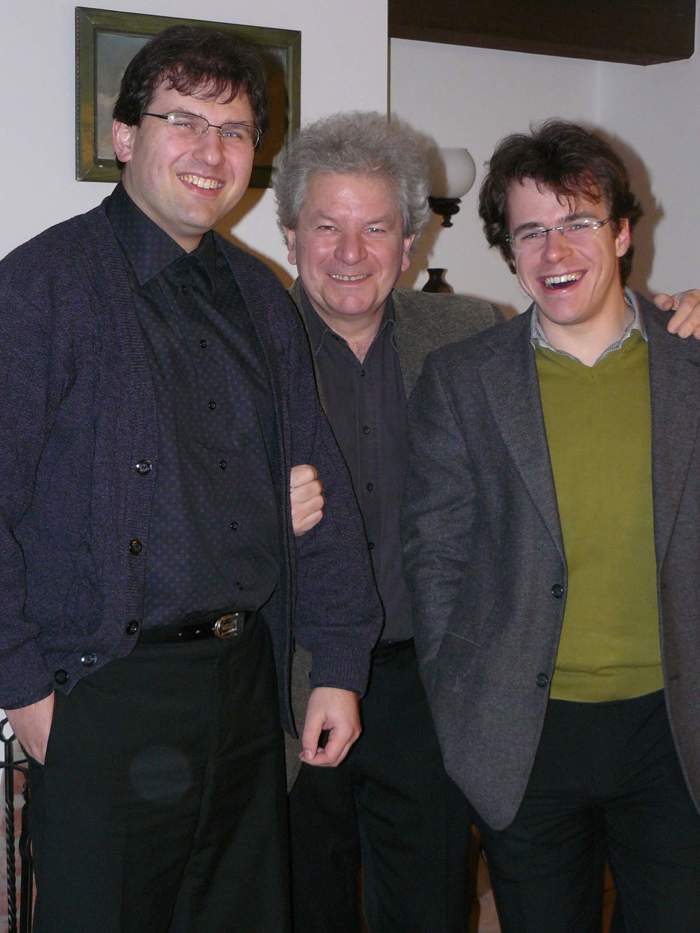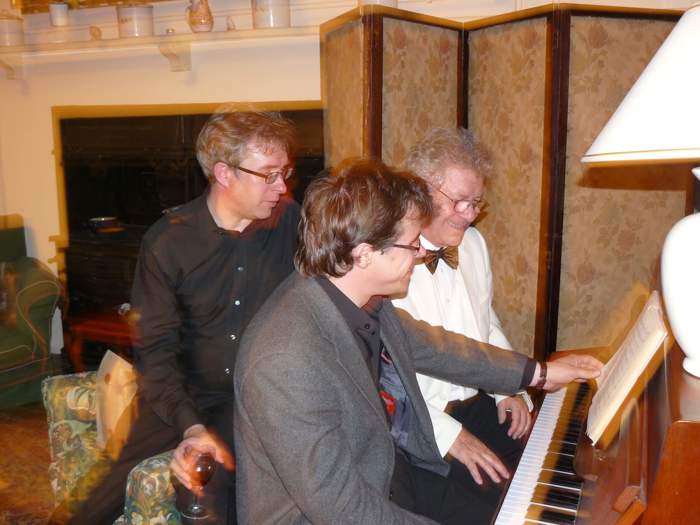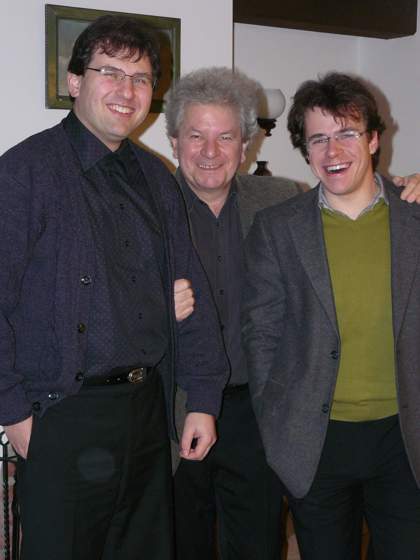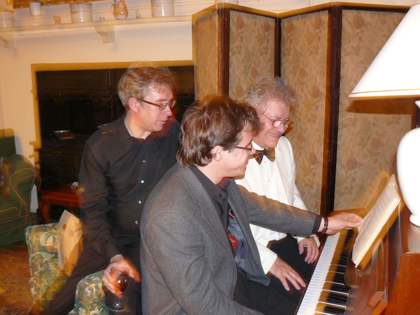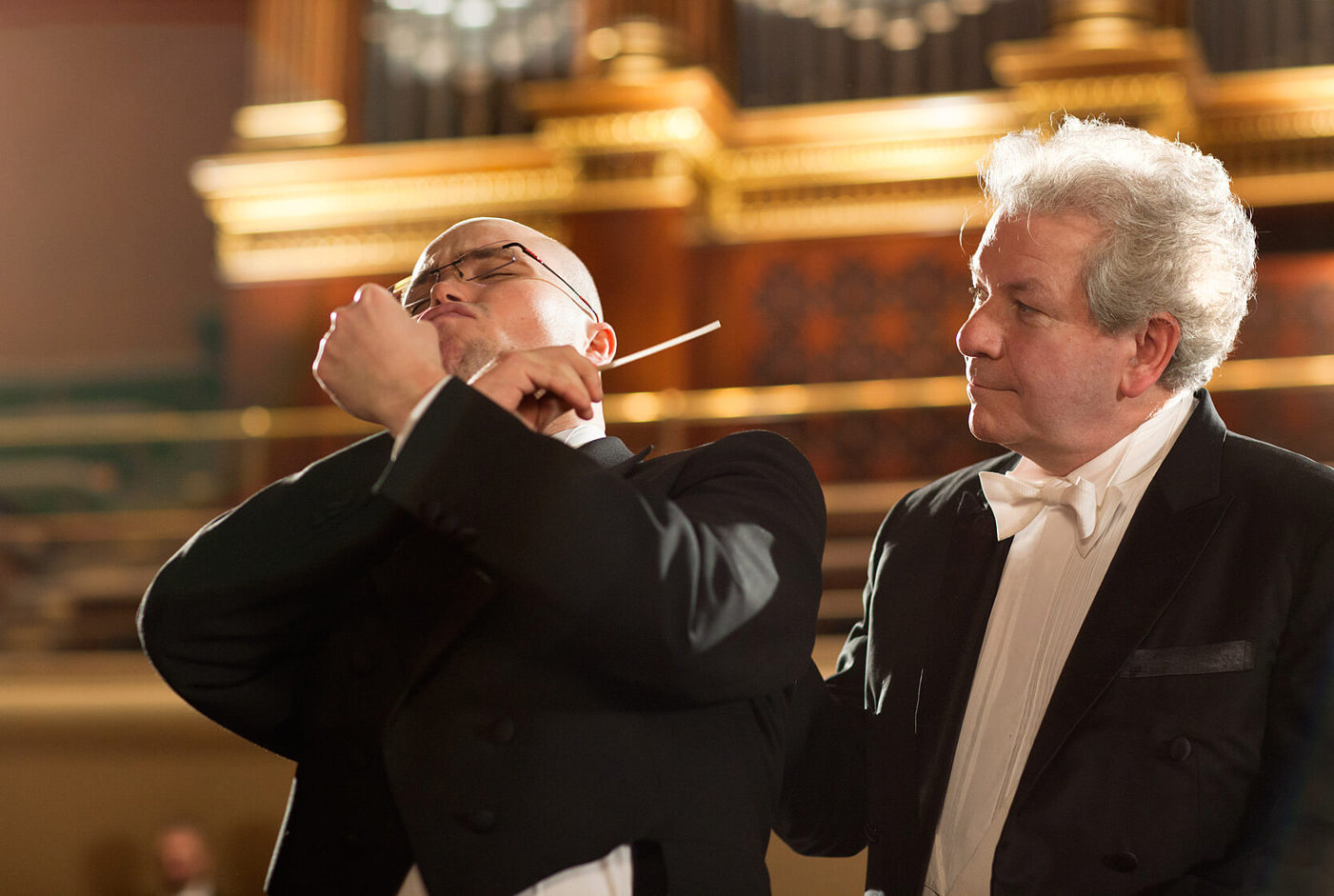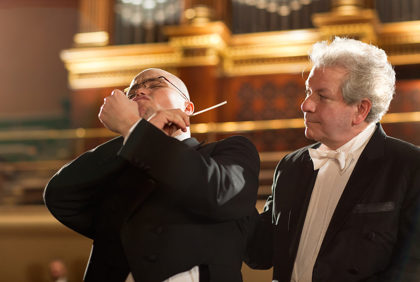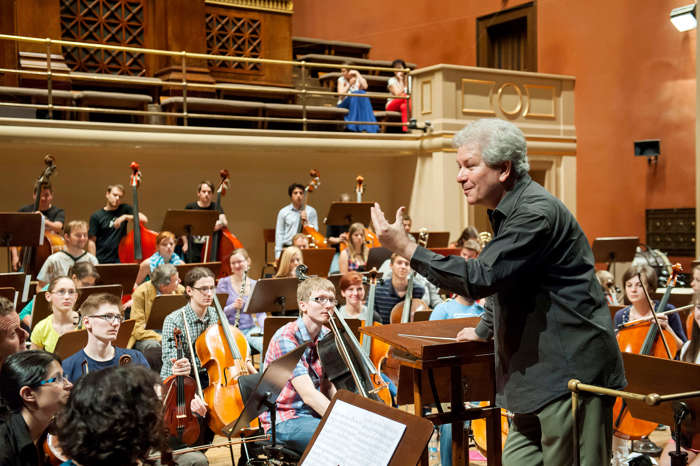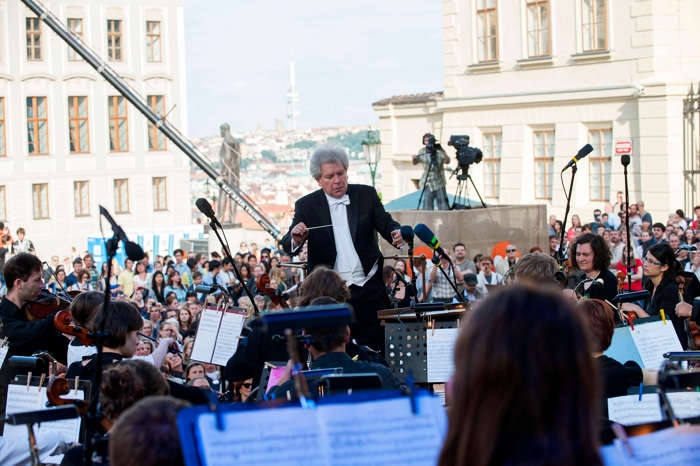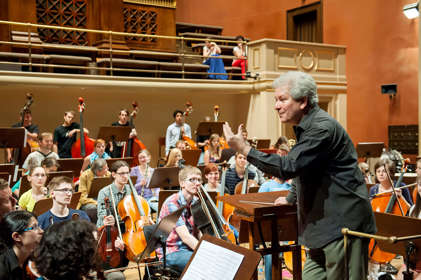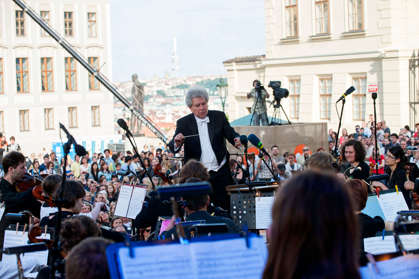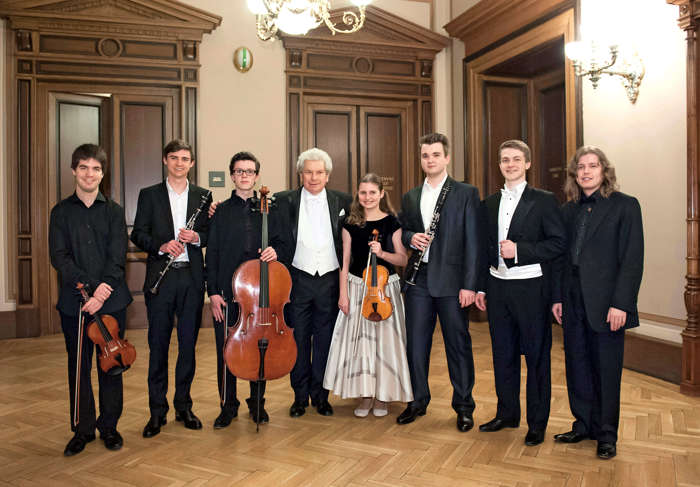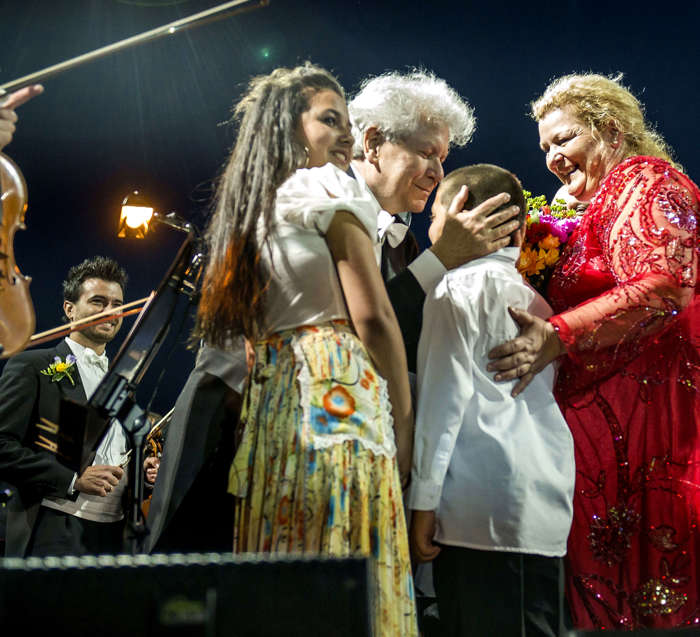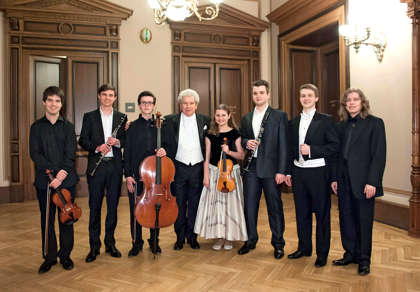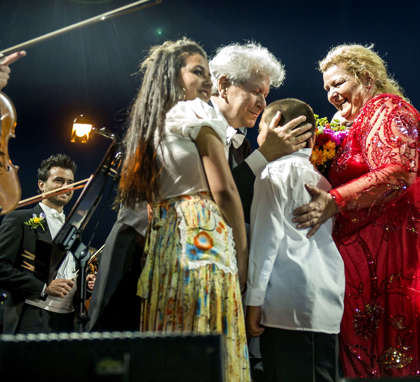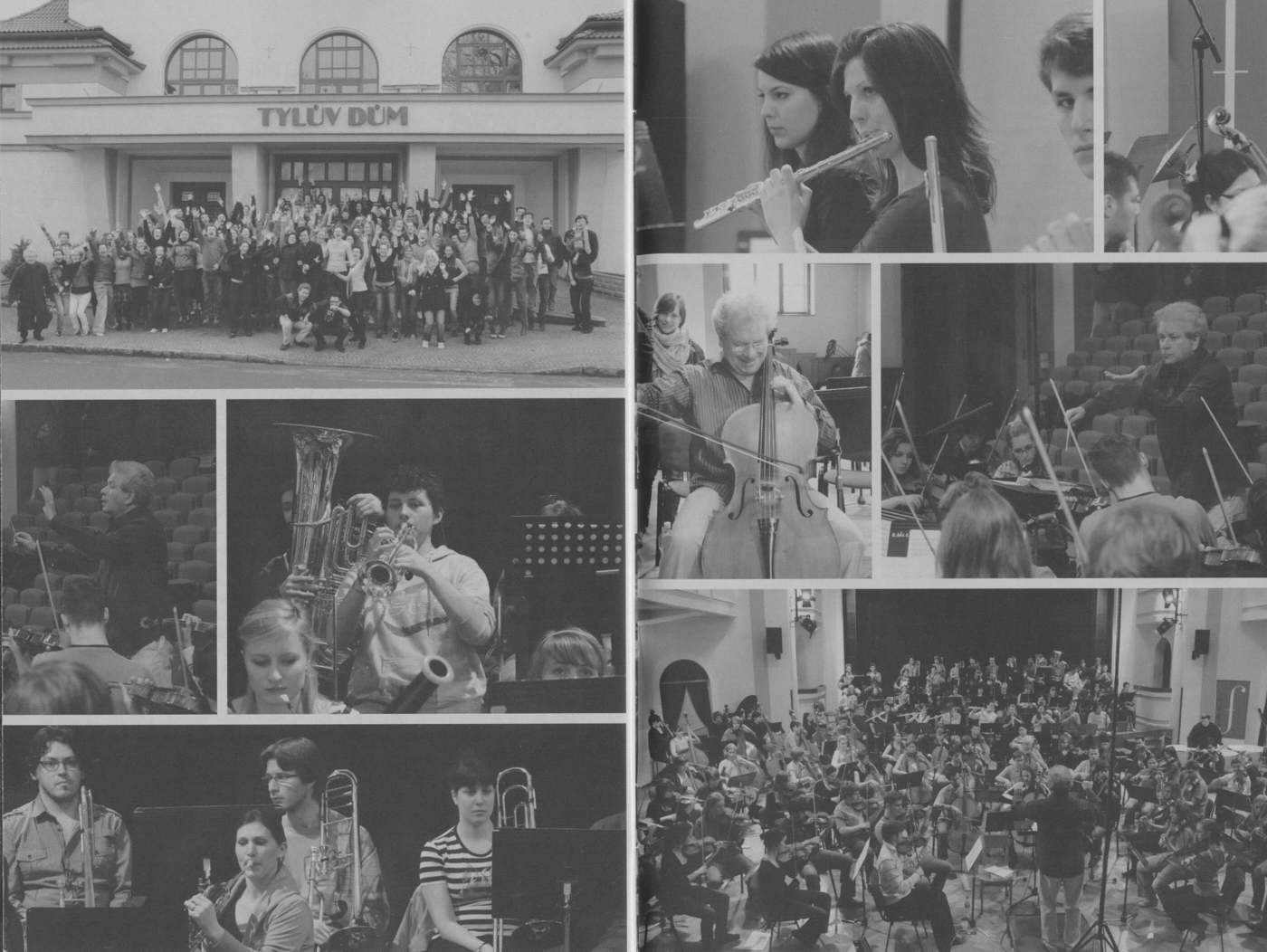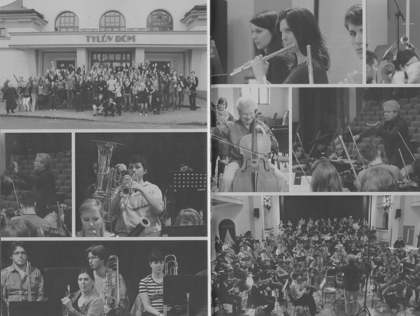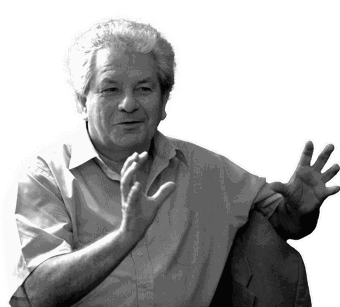„The process of becoming a conductor is a very slow one. Of course, there are some prerequisites and talents that are given – an ability to listen, to communicate, but it is also a matter of practice, training and self-development. The given factors and the work are surely in balance. I believe that all the talent, imagination and the whole potential that germinate in a person will not bear fruit without immense work and effort. The work component is essential.“
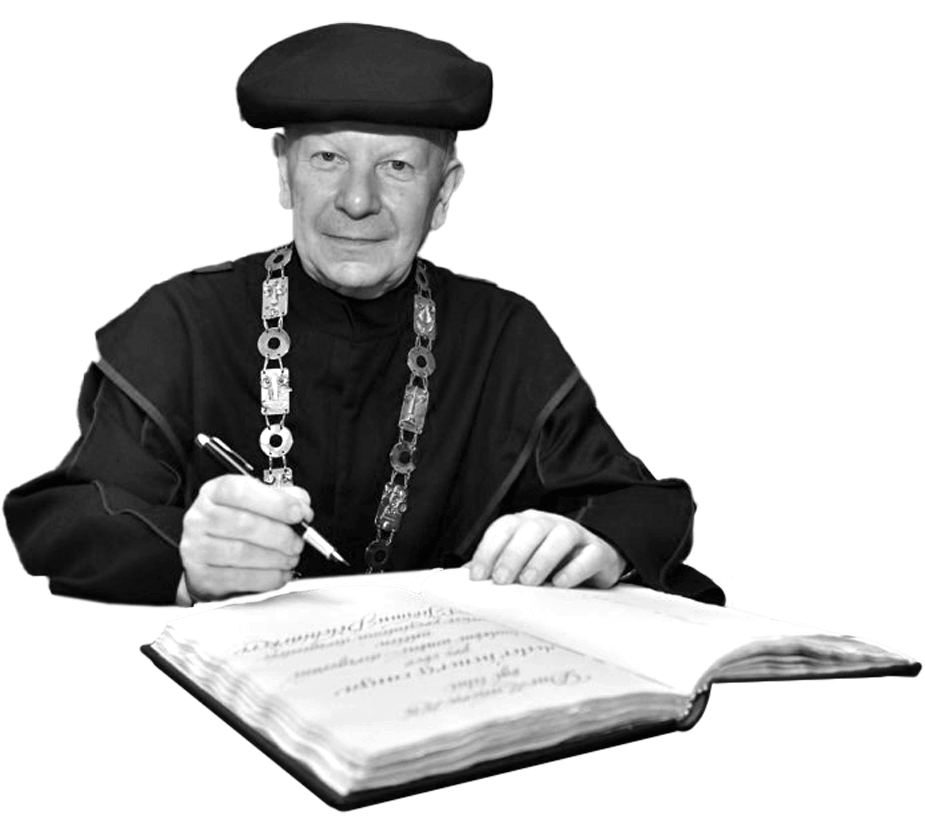
The teaching dimension of Bělohlávek’s professional career started to gain importance in the late-1980s. He tried working with musical youth on a larger scale already in 1987 within the International Youth Philharmonic project, in which he rehearsed and conducted a concert tour of a one-hundred-and-twenty-member orchestra consisting of students from conservatoires and academies from six socialist states. The educational aspect of his conducting became even more prominent after the founding of the PKF – Prague Philharmonia, which consisted of young instrumentalists of about twenty years of age.
An Academic Teacher
Life and the Creator bestowed many gifts on me. When I became aware of them, I started to be interested in what ways I could give something back, pay it back. And this is one of the ways to pass on what I have gained, to give to the young what I have gathered.
Bělohlávek’s first institutionally anchored teaching position was between 1990 and 1995 when he was Tomáš Hanus’ conducting teacher at the Janáček Academy in Brno. Bělohlávek became, on Hanus’ request, an external teacher at the academy. Due to the minimal number of students, his teaching was usually in the form of the two of them discussing scores at the piano. “I felt that he was forming me in his image, that he was not imposing his gestures on me. He tried to pass on some fundamental technique but in such a way that expressed his great respect for the student’s personality. He tried to discover the way that would work the best for me instead of forcing me into something. I have never experienced such respect from anyone else.” [ 3 ]
Bělohlávek had a much larger number of students later at the Academy for Performing Arts in Prague. He started his teaching position there in 1995 and two years later he was appointed professor by president Václav Havel (1997). 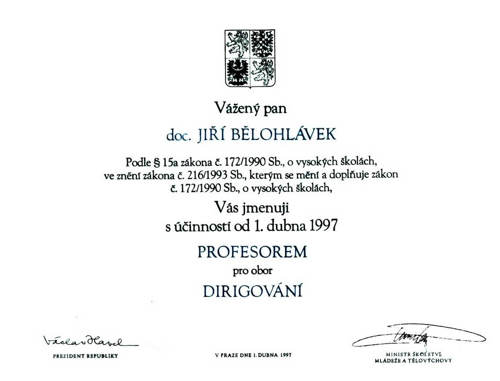 Together with his colleagues František Vajnar, Josef Kuchinka, Radomil Eliška, Jiří Chvála and Tomáš Koutník, Bělohlávek helped develop the department of conducting. During his era, students had the opportunity to conduct a full-length concert on a regular basis which enabled them to get acquainted with the demands and trickiness of their profession. Bělohlávek saw in this possibility of real practice one of the most important points in the study process. He always emphasised how important it was for an artist to have the opportunity at every stage of his or her development – especially during or shortly after the study years – to apply acquired skills while solving and tackling real tasks. It is therefore understandable that when the department lost the privilege of such – financially demanding but indispensable – concerts and Bělohlávek’s efforts to renew them failed, he first limited and in 2009 ended his engagement at the Academy.
Together with his colleagues František Vajnar, Josef Kuchinka, Radomil Eliška, Jiří Chvála and Tomáš Koutník, Bělohlávek helped develop the department of conducting. During his era, students had the opportunity to conduct a full-length concert on a regular basis which enabled them to get acquainted with the demands and trickiness of their profession. Bělohlávek saw in this possibility of real practice one of the most important points in the study process. He always emphasised how important it was for an artist to have the opportunity at every stage of his or her development – especially during or shortly after the study years – to apply acquired skills while solving and tackling real tasks. It is therefore understandable that when the department lost the privilege of such – financially demanding but indispensable – concerts and Bělohlávek’s efforts to renew them failed, he first limited and in 2009 ended his engagement at the Academy.
I am actually quite sceptical about the possibilities to teach conducting. Teaching conducting is a tricky thing and what can be taught are only the fundamentals of conducting technique and general rules concerning communication through gestures. Everything else is given by the mutual relationship between the teacher and the student, so that the teacher is not limited by the student’s personality on the one hand, and the teacher does not make the mistake of imposing his own opinion on the student on the other hand. In the subtle balance of these two poles, there lies the secret of a successful relationship between a student and a teacher. A prerequisite of it is their mutual openness and good relationship.
As a teacher, Bělohlávek believed in an open relationship with students. He was aware of the fact that such a relationship bears in itself mutual influence in which both sides give and get at the same time. In addition to lessons and sharing practical know-how, he invited his students to rehearsals of Prague-based orchestras, he had discussions about technical and personal problems connected to the profession, and shared his conducting experience with his students. And he inspired them by his work and personality.
My teaching activities were very enriching for me, I was lucky to have taught interesting and eager students and that my whole involvement at the Academy brought me joy. (…) Every single one of the young men I taught was a world in itself, and it was a challenge simply to reach them, as everyone had their own inhibitions and a manner of approaching the teacher. In some cases, I really had to search in which way to approach them so that it would not be difficult for them to accept what I wanted to pass on.
I appreciated Jiří Bělohlávek as a teacher from the first moment we met. He was amazingly precise and attentive to every detail of the score and technical aspects of conducting, moreover he was willing to help each student with any question. He loved discussions! Due to my boldness, these discussions were often quite passionate, and I had to have convincing arguments ready. He really loved to blast away deficient theories and, with all his knowledge, was well equipped to do so. He would often return to our past discussions, in general he thought deeply about things, and for a long time, too.
The success of Bělohlávek’s teaching activities is shown by how many of his students are conductors of Czech and foreign ensembles today. The six most successful so far are these: Jakub Hrůša, the chief conductor of the Bamberger Symphoniker and the principal guest conductor of the Czech Philharmonic, with whom Bělohlávek had a very friendly relationship; Tomáš Hanus, Bělohlávek’s first student and friend, the chief conductor of the Welsh National Opera in Cardiff; Tomáš Netopil, the chief conductor of the Aalto-Theater opera orchestra in Essen and the principal guest conductor of the Czech Philharmonic; Zbyněk Müller, until recently the chief conductor of the State Philharmonic in Košice and a conductor at the National Theatre in Prague; Marko Ivanović, the music director of the Opera of the National Theatre Brno; and Ondřej Vrabec, who in addition to his position of a French horn player in the Czech Philharmonic was also the assistant conductor of the orchestra during Bělohlávek’s era. These artists are a great asset to Czech music, both now and in the future.
We who were so lucky to be his students appeared in a wonderful situation that cannot be repeated: We were in close contact with a person who was a natural teacher able to convey many things in a human, strict and at the same time kind way while being an active artist, who next to his teaching – and I still cannot grasp how come he managed to find so much time for us – was right in the epicentre of the conducting world and immensely active there. (…) This combination of a man who not only teaches but also performs at the highest possible level was always wonderfully inspiring for us.
Guide and mentor. Inspirator and initiator
Bělohlávek’s educational activities were not limited to conducting only. Everyone who had the opportunity to collaborate with him during his or her “apprentice” years will testify to the fact that he would not hesitate to help anyone in whom he felt keen interest in music grow artistically – by providing an opportunity, recommendation, advice, or long-term mentoring, by directing them to a suitable teacher or ensemble. Many soloists, first members of the PKF – Prague Philharmonia and students who took part in the student projects could speak about it in length.
At that time, Jiří Bělohlávek collaborated with the Metropolitan opera intensively, he was staging Rusalka with Renée Fleming and Eugene Onegin with Karita Mattila and Thomas Hampson. He made it possible for me to attend their rehearsals. And he would also come to my concerts. Right after the concert, he would send me an e-mail with a complimentary or critical review, comments on my playing valuable to me until this day.
Bělohlávek was the initiator, co-initiator and an enthusiastic participant of many projects that went in line with his idea of providing musicians with opportunities to grow. Student orchestras and various instrumental and singing competitions such as Zahraj si s Českou filharmonií (Play with the Czech Philharmonic) were a good form in which this idea could be applied on a large number of young musicians.
Bělohlávek obviously could not focus intensively on each individual young student, but these activities had a different dimension – they motivated the young musicians to give their best and they were a source of impulses and inspiration for further development. One of these projects was the orchestra consisting of students of the Prague Conservatoire with which Bělohlávek and his colleagues studied and performed Smetana’s Má vlast at the opening concert of the Prague Spring Festival in May 2011 marking the bicentennial of the Conservatoire. He also initiated a joint project of the Czech Philharmonic and the Association of Elementary Art Schools, in which, on a yearly basis starting in the 2013/2014 season, selected elementary art schools students and selected members of the Czech Philharmonic join together to perform a public concert. Bělohlávek took part in the first three years and together with Ladislav Cigler they performed Smetana’s Šárka, Dvořák’s Symphony No.8 and Glinka’s Overture to Ruslan and Ludmila.
I also find the conductor very nice and understanding. I liked how the orchestra, right after the first meeting with him, changed colours, everything was beautiful and balanced.
The work that Mr. Bělohlávek has done with us since Monday is incredible. We are beginning to play like a professional orchestra.
That we can change colours, that must be caused by this Bělohlávek.
I think that for most of us it was the first experience and the most important thing is the concentration and the great authority who everyone really follows, and so we proceed really fast in contrast to the rehearsals in Prague.
The life of Jiří Bělohlávek as seen by Jan Špáta
A documentary film of the Genus cycle
Made in 1996
Script writer, director and cameraman: Jan Špáta
Main sources
- 1.
VAŠATOVÁ, Jana: Telefonotéka. Český rozhlas Vltava 2016. (14. 1.) Available online
- 2.
VÁŇA, Ladislav (scénář a režie): Tenerezza. Filmový dokument. Česká televize 1993
- 3.
VEBER, Pavel: Tomáš Hanus. Dirigent stojící na obou nohou. Harmonie 2017, č. 12, s. 12–15.
- 4.
VÁŇA, Ladislav (scénář a režie): Tenerezza. Filmový dokument. Česká televize 1993.
- 5.
GOLDSCHEIDER, Alexander: Jiří Bělohlávek: O hudbě. Obecní noviny. Informační měsíčník členů Židovské obce v Praze 2021, č. 12, s. 22–25.
- 6.
PETR, Jaroslav: Ondřej Vrabec: Ideální dirigent je stejný jako ideální politik. Opera PLUS 2019 (30. 3.) Available online
- 7.
Telefonotéka. Český rozhlas Vltava 2016, 14. 1. Available online
- 8.
SOJKOVÁ, Alena: U hudby zapomenete na čas. Rozhovor s Janem Bartošem. Český rozhlas. Týdeník rozhlas 2019 (10. 2.) Dostupné online
- 9.
Mladí hudebníci pod taktovkou mistra. Rozhlasová reportáž ze soustředění v Poličce v březnu 2011. Český rozhlas Vltava 2017. Available online
VAŠATOVÁ, Jana: Telefonotéka. Český rozhlas Vltava 2016. (14. 1.) Available online
VÁŇA, Ladislav (scénář a režie): Tenerezza. Filmový dokument. Česká televize 1993
VEBER, Pavel: Tomáš Hanus. Dirigent stojící na obou nohou. Harmonie 2017, č. 12, s. 12–15.
VÁŇA, Ladislav (scénář a režie): Tenerezza. Filmový dokument. Česká televize 1993.
GOLDSCHEIDER, Alexander: Jiří Bělohlávek: O hudbě. Obecní noviny. Informační měsíčník členů Židovské obce v Praze 2021, č. 12, s. 22–25.
PETR, Jaroslav: Ondřej Vrabec: Ideální dirigent je stejný jako ideální politik. Opera PLUS 2019 (30. 3.) Available online
Telefonotéka. Český rozhlas Vltava 2016, 14. 1. Available online
SOJKOVÁ, Alena: U hudby zapomenete na čas. Rozhovor s Janem Bartošem. Český rozhlas. Týdeník rozhlas 2019 (10. 2.) Dostupné online
Mladí hudebníci pod taktovkou mistra. Rozhlasová reportáž ze soustředění v Poličce v březnu 2011. Český rozhlas Vltava 2017. Available online
